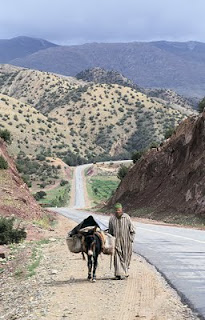-
Teaching Demographic Security: Jennifer Sciubba on Explaining Population’s Conflict Links to Undergrads
›October 7, 2009 // By Wilson Center StaffFor students, looking at national security through the lens of demography can be challenging and frustrating, says Jennifer Dabbs Sciubba, a Mellon Environmental Fellow and professor at Rhodes College. “You really have to start at the beginning and explain the fundamentals of, ‘What is population in the first place?’” she told ECSP Director Geoff Dabelko of her undergraduate courses on population-environment and population-security connections.
However, Sciubba says her students seem equally interested in the courses’ demographic themes, including migration, youth, the demographic dividend, ageing, and urbanization. To her surprise, one of the most popular topics was population age structure.
Military audiences are quicker to understand the connections between population, peace, and conflict, says Sciubba. “You can assume a level of knowledge about demography that the undergraduates have not had,” she explains. -
Missives From Marrakech: Growing and Slowing, and a Letter From the King
›October 5, 2009 // By Gib Clarke Here in Morocco, where I am attending the IUSSP conference on population, if you never went to elementary school or if you married at a young age, you are likely to have more children.
Here in Morocco, where I am attending the IUSSP conference on population, if you never went to elementary school or if you married at a young age, you are likely to have more children.
A Bangladeshi couple is more likely to have a third child if they have 0-1 sons, but a European couple is increasingly likely to prefer daughters because they take better care of their aging parents.
Globally, a forthcoming Harvard study shows that the “Reproductive Health Laws Index”—which includes the legal framework governing abortion, condoms, IUDs, and birth control pills—can predict fertility (more liberal laws = fewer children) and potentially increase female participation in the labor force.
Such causes of population growth are favorite topics for demographers and family planning experts here at the conference, and were quite well attended. However, perhaps due to the large number of European attendees, the panels on this popular topic were empty in comparison to those examining aging, fertility decline, and migration—issues at the forefront of European policymakers’ agendas.
A Message From His Majesty
“One of the characteristic features of our population policy stems from our firm belief that [its] impact … cannot be determined in isolation from economic, social, cultural and political factors,” wrote Morocco’s King Mohammed VI in a welcome letter delivered to the conference, which also discussed aging, climate change, food security,natural resource scarcity, the economic crisis, and growing levels of income inequality.
Morocco is taking steps to tackle this complicated set of problems. The government has launched a National Initiative for Human Development to fight poverty and social inequalities, and help Morocco meet the Millennium Development Goals (MDGs). He also notes that the country’s “political and social reforms aimed at increasing the scope of democratic participation and ensuring the advancement of women.”
Like all leaders, Morocco’s will be measured not by his words—eloquent as these may be—but by his deeds and the country’s progress. Morocco has some work to do to reach the MDGs and other social and economic goals. -
Watch: Nicholas Kristof on Maternal Mortality
›“Although a half million women die each year, that doesn’t get attention, because the victims invariably have three strikes against them: They are poor, they are rural, and they are female,” journalist Nicholas Kristof says in a video interview about his new book, Half the Sky: Turning Oppression into Opportunity for Women Worldwide.
“If men had uteruses and were dying at this rate, every country would have a minister of paternal mortality, the security council would be meeting, this would be a real international priority,” he says.
Recently launched at the Wilson Center, Half the Sky tells the transformational stories of women and girls who are the “face of statistics” on four appalling realities: maternal mortality, sexual violence, and lack of education and economic opportunities.
“So many Americans want to help, but are skeptical,” so Half the Sky offers a “do-it-yourself toolkit,” says Kristof. People “can truly save individual women’s lives out there, and their babies’ lives, that would otherwise die.” -
VIDEO: Nicholas Kristof On Comprehensive Approaches to Family Planning
›October 2, 2009 // By Wilson Center Staff“Poor countries can’t begin to deal with food issues, with economic pressures, with conflict and shortages of water and grassland that may lead to social conflict, unless they begin to deal with population problems,” journalist Nicholas Kristof tells ECSP Director Geoff Dabelko in a video interview.
But “the single most effective contraceptive isn’t any kind of device,” Kristof says, “it’s girl’s education. And that has the most extraordinary impact on birthrates.” Unfortunately, this approach to family planning has “been neglected in the last 20 years.”
Empowering women and girls may be our best strategy for fighting poverty, claim Kristof and WuDunn in their new book, Half the Sky: Turning Oppression into Opportunity for Women Worldwide, which was launched at the Wilson Center.
Half the Sky tells the transformational stories of women and girls who are the “face of statistics” on four appalling realities: maternal mortality, sexual violence, and lack of education and economic opportunities. -
Missives From Marrakech: Enter the Environment
›October 2, 2009 // By Gib Clarke
“Contraception is the cheapest way to combat climate change,” read the headline of The Telegraph in mid-September, announcing the release of “Fewer Emitters, Lower Emissions, Less Cost,”a study from the Optimum Population Trust (OPT) and the London School of Economics (LSE). Similar stories appeared in newspapers around the world.
Though there has been near-universal agreement that the OPT-LSE paper oversimplifies the link between demography and climate change, the buzz among the family planning and environment communities has continued during the IUSSP conference in Marrakech. Perhaps this is because demographers are not used to appearing in the press except when discussing census results. More likely it is the timing of the report, with the Copenhagen conference on climate change coming in December.The buzz hit a peak on Thursday at the IUSSP, with a plenary presentation examining the links. Wolfgang Lutz jumped right in, noting that it’s not as simple as the OPT-LSE study makes it. Population growth is important, but size is not the only thing that matters; other aspects such as age distribution, household structures, and levels of urbanization come into play as well.
In addition, between population size and climate change lie a number of intermediary factors, such as consumption levels, technology improvements, and greenhouse gas (GHG) emissions. Lutz argued that demography has a unique contribution to make to the climate discussion, for no other discipline understands the composition of different populations in different places both now and in the future. Therefore, demographers should explain how different groups will contribute to climate change, and how they will suffer the consequences, so that adaptive capacities can be strengthened and social programs can fill the gaps.
Leiwen Jiang described research conducted by some of the giants in climate and demography: National Center for Atmospheric Research, International Institute for Applied Systems Analysis, and Population Action International. Their work uses a “PET” model – Population, Environment, and Technology – which looks at how the PET elements impact four critical predictors of GHG emissions: consumption, energy use, labor, and savings. A forthcoming paper by this group will delineate the complete findings, including the potential for GHG “savings” brought by decreases in fertility and thus reduced population growth, as well as the added GHG due to future urbanization.
Susana Adamo took a step back to show the audience the view from 30,000 feet – literally, with maps demonstrating that population density is highest in areas most vulnerable to impacts of climate change, such as sea-level rises, droughts, floods, and other severe weather events.
Unfortunately, one of the stars of this research, Brian O’Neill, was unable to attend, due to health reasons. His research, to be published soon, is highly anticipated, and should add additional quantitative fuel to the fire.
Not Just Climate
Environmental links with population and demographic factors have also factored in other parts of this “demography” conference. A host of sessions, many organized by the Population-Environment Research Network, have explored linkages between population growth, migration, and urbanization on the demographic side; and deforestation, natural resource management, and environmental degradation on the environmental side. Questions concerning these and other environmental factors have surfaced at panels exclusively dedicated to other topics such as family planning. Some sessions examined how population and environment concerns can be jointly addressed.
It is encouraging to see demographers and reproductive health specialists taking climate and environmental factors so seriously. The response from the environmental community has been mixed, with some interest in population issues, but also some opposition from the climate community to including discussions of family planning in an already controversial topic. At a similarly large gathering of environmentalists and conservationists, the 2008 IUCN conference in Barcelona, only two sessions addressed health or population. So we have a long way to go progress to unite these communities of researchers and practitioners, and come together in a truly fruitful engagement.
Photo courtesy World Bank Photo Collection. -
Missives From Marrakech: 50 Years of Counting. And Counting.
›September 29, 2009 // By Gib Clarke Demographers often get a bad rap for being boring. There’s a saying that demography is all about sex—but the details aren’t as much fun. To find out, I’m in Marrakech, Morocco, reporting on the biennial gathering of number crunchers, the 26th conference of the International Union for the Scientific Study of Population (IUSSP). After the first day, I have only 4 days, 86 panels, 327 presentations, 5,340 PowerPoint slides, and 426 poster presentations left to go.
Demographers often get a bad rap for being boring. There’s a saying that demography is all about sex—but the details aren’t as much fun. To find out, I’m in Marrakech, Morocco, reporting on the biennial gathering of number crunchers, the 26th conference of the International Union for the Scientific Study of Population (IUSSP). After the first day, I have only 4 days, 86 panels, 327 presentations, 5,340 PowerPoint slides, and 426 poster presentations left to go.
To most of you, this may not seem exciting. But it is terrifically important. For example, at a panel on maternal health, the presenters offered easier, more accurate, and less expensive ways to collect maternal mortality data, which led to a discussion of strategies for meeting MDG 5 and for improving maternal and infant health throughout the world. Similar panels addressed the challenges facing scientists and programmers working on issues as disparate as water, migration, and the effect of armed conflict on children.
For its 50th Anniversary, IUSSP also indulged in a bit of navel-gazing. Wolfgang Lutz called for more research on predictions and more policy recommendations—what he dubbed the “Demographers’ Transition” (an inside joke, to be sure). Ndola Prata’s “Opportunity Model” (developed jointly with Malcolm Potts and Martha Campbell), argues that use of contraceptives may increase simply if they are more available. Borrowing from marketing theory and such examples as remote controls and Post-It notes, the model generated quite an uproar. A UNFPA-hosted plenary on “After Cairo” closed the day with a strategic discussion about future population, family planning, reproductive health, and development strategies.
A Visit to the Hospital
At the Ibn Zohr Hospital’s crisis center in Marrakech, victims of sexual, physical, and psychological violence are treated and counseled free of charge. Though only founded in 2006, the clinic has defied expectations by helping hundreds of women and children each year, thanks in large part to an effective referral network comprising NGOs, media (especially radio), the police, hospitals, and health professionals. “Listening centers,” local outposts offering basic education on health and rights, are responsible for 56 percent of all referrals.
Ibn Zohr’s services are funded by the Moroccan government and UNFPA. Data has been collected since service delivery began, and shows that the overwhelming type of abuse suffered by women is physical (86 percent), while children under 15 report a mix of sexual (40 percent) and physical (43 percent) abuse, with more sexual abuse occurring among boys than girls.
Other IUSSP site visits included a rural reproductive health clinic, a center for abandoned children, and a house for female students. Too often, site visits are far away from the conference and before or after the main events, costing attendees extra time and money. Instead, the IUSSP site visits are here in Marrakech, where even the most experienced practitioners can learn more about Morocco’s unique blend of modernization and religious and cultural conservatism. These trips are truly unique and invaluable learning opportunities—organizers of similar conferences take note.
Gib Clarke reported from Marrakech, Morocco.
Photo courtesy flickr user DavidDennisPhotos. -
Columbia University’s Marc Levy on Mapping Population and Geographic Data
›September 24, 2009 // By Brian KleinAn interactive tool from Columbia University, the Gridded Population of the World (GPW) database, makes it easy to combine population and geographic data, explains Marc Levy, director of CIESIN at Columbia, in an interview with ECSP Director Geoff Dabelko.
“If you want to ask questions about how people are located with respect to drought hazards, for example, you can take your map of the location of droughts, overlay it with our map of population, and then you can get a sense of how many people are located in these drought zones,” Levy says. The user can do the same thing with infectious disease risk, vulnerability to sea-level rise, and other indicators.
GPW’s data is available to the public as:- A gallery of maps created by CIESIN;
- Raw data that can be downloaded in GIS format;
- An open web-mapping service that can be linked to Google Earth;
- TerraViva!, a program for user-generated maps.
-
Dutch Minister for Development Cooperation Bert Koenders on the Future of Family Planning
›September 22, 2009 // By Gib Clarke“I think everybody…will agree that family planning is one of the biggest success stories of development cooperation. I also consider the paradigm shift in this field from top-down family planning (FP) to programs of reproductive health (RH) and rights for couples and individuals adopted in Cairo in 1994 to be a success story,” said Bert Koenders, the Dutch Minister for Development Cooperation, in a statement prepared for a roundtable discussion at the Wilson Center on future strategies in FP and RH.
Looking beyond the successes of the past, Koenders identifies a series of opportunities and challenges facing the RH community. He cites as the first opportunity the potential to “join forces” with the United States to meet Millennium Development Goal #5 (which focuses on maternal, sexual, and reproductive health, and family planning). He calls MDG 5 “the mother of all MDGs” and says that if it is not met, “then the other MDGs will not be attained either. It is smart economics to invest in MDG 5.” Other opportunities include public-private partnerships and the “growing awareness” in developed and developing countries alike.
The challenges, however, are significant. Youth, he notes, account for half of the world’s population and face barriers in access to reproductive health information and commodities. To overcome these barriers, we must first identify what adolescents and unmarried women and couples need, and recognize their rights to the same quality services as older and married women and couples. Koenders also says there is a growing opposition in many parts of the world to sexual and reproductive health and rights, and that programs must address this in order to be successful.
The roundtable discussion, to be held on September 22 at the Wilson Center, features Musimbi Kanyoro of the Packard Foundation, José “Oying” Rimon of the Gates Foundation, and Scott Radloff of the U.S. Agency for International Development.
Showing posts from category *Main.


 Here in Morocco, where I am attending the
Here in Morocco, where I am attending the  Demographers often get a bad rap for being boring. There’s a saying that demography is all about sex—but the details aren’t as much fun. To find out, I’m in Marrakech, Morocco, reporting on the biennial gathering of number crunchers, the
Demographers often get a bad rap for being boring. There’s a saying that demography is all about sex—but the details aren’t as much fun. To find out, I’m in Marrakech, Morocco, reporting on the biennial gathering of number crunchers, the 

